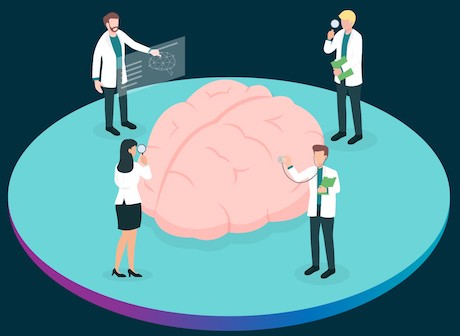
By Dr. Brandon Colby MD, a Personalized Preventive Medicine specialist and expert in clinical genomics.
When we think of the possible ailments that we could develop during our senior years, Alzheimer’s disease is probably one of the options that we all fear the most.
Alzheimer’s disease is the most common type of dementia.1 Dementia isn’t a single, specific disease — instead, it’s a term used to describe a combination of symptoms that includes the progressive loss of different cognitive functions, such as memory, orientation, language, and attention. As a result, Alzheimer’s disease and other types of dementia have a significant impact on a person’s everyday life, and in the lives of their loved ones and caregivers.
Similarly to other types of dementia, Alzheimer’s disease leads to progressive impairment and different symptoms, which include:
- Memory loss
- Mood swings
- Self-neglect
- Agitation
- Anxiety
- Disorientation
- Depression
- Apathy
- Aggression
- Hallucinations
- Delusions
- Psychosis
Once upon a time — but really, up until fairly recently — it was widely believed that dementia was just a normal part of aging and that we all developed it if we lived to be old enough. In fact, dementia was such a “normal” part of human aging that for many centuries, doctors didn’t even try to prevent nor treat dementia.
But now, we know that dementia is separate from regular, healthy aging. We also know that preventative measures can help prevent or slow the onset of Alzheimer’s disease. Normal aging still leads to a certain degree of decline in our cognitive function, but this isn’t as severe as what happens in Alzheimer’s disease.
Thankfully, there are many different things we can all do to assess our risk of developing Alzheimer’s disease, and also to keep our brains healthy as we get older. After all — aging is a privilege, and we owe it to ourselves to do everything we can to stay healthy.
Let’s talk more about the genetics of Alzheimer’s disease.
Is Alzheimer's Genetic?

Alzheimer’s disease isn’t a genetic condition, but that doesn’t mean that your genetic information doesn’t play a role in the development of this disease.
Many people have the misconception that your risk of developing Alzheimer’s disease is set in stone — you’ll either definitely get it, or you definitely won’t. But in reality, Alzheimer’s disease is a multifactorial disease, which means that many different aspects of a person’s life play a role in defining whether they will have Alzheimer’s disease later on in life, and you can have different risk factors for the disease.2
Indeed, certain genetic variants can increase your risk of developing Alzheimer’s disease, but this increased risk doesn’t necessarily have to translate into having the disease. There are many different preventative measures that you can adopt in order to prevent Alzheimer’s disease — in fact, practically anyone can benefit from these healthy strategies, whether they have a heightened risk of Alzheimer’s disease or not.
One gene plays a particularly important role in determining whether you develop Alzheimer's or not: the APOE gene.
What is the APOE gene?
The APOE gene plays different roles in our brain function; among other things, it produces a protein called apolipoprotein E, which helps eliminate deposits of a substance called amyloid-beta peptide that can accumulate and form amyloid plaques. These amyloid plaques hinder brain function and eventually lead to Alzheimer’s disease.
This gene also aids in the maintenance of a normal brain function synaptic plasticity, which is the process through which our brain cells establish synapses to communicate with each other. For these reasons, the APOE gene and its alleles play a very important role in the development of Alzheimer’s disease.3
The genetic variants that can affect your risk of developing late-onset Alzheimer’s disease are:
-
APOE2: this is the least common allele of this gene, and it enables the APOE gene to synthesize larger amounts of apolipoprotein E, thus protecting your brain against Alzheimer’s.
-
APOE3: this is the “neutral” allele of the APOE gene since it doesn’t seem to affect the production of apolipoprotein E. As a result, this variant neither decreases nor increases your susceptibility to Alzheimer’s. However, research has found that APOE3 in combination with specific variants in other genes could lead to an increased risk of Alzheimer’s disease for some people.
-
APOE4: finally, the APOE4 allele hinders the production of apolipoprotein E, which could put you at an increased risk of developing the disease.
Keep in mind that we all inherit two copies of the APOE gene, one from each parent. Inheriting at least one APOE4 allele increases a person’s risk for developing Alzheimer’s, and inheriting copies of the APOE4 allele from both your parents will make that risk even higher. APOE4 can also increase your risk of developing Alzheimer’s disease earlier in life.
Having copies of the E2 allele, on the other hand, can genetically protect you from the disease.
However, many people with one or two copies of the APOE4 allele never develop the disease, whereas others who don’t have this variant end up developing Alzheimer’s. Because Alzheimer’s isn’t a purely genetic disease, our actions and the preventative measures we take can offset the effects of our APOE gene.
Additionally, research has shown that genetic mutations that affect alleles in other genes can also act as genetic risk factors for late-onset Alzheimer’s. These genes include:
- ABCA7 gene
- GAB2 gene
- TOMM40 gene
- CLU gene
- CR1 gene
- PICALM gene
- PLD3 gene
- TREM2 gene
- SORL1 gene
The Genetics of Early-Onset Alzheimer’s Disease
In addition to the more common late-onset Alzheimer’s, there’s also early-onset Alzheimer’s disease or early-onset familial Alzheimer's. In this onset form, symptoms begin to appear before the age of 65 years old.4 Although it’s not common, people can even develop early-onset Alzheimer’s disease during their 30s or 40s.
Research has found that three specific genes play a role in the disease risk for early-onset Alzheimer’s. These genes are:
- Amyloid precursor protein (APP)
- Presenilin 1 (PSEN1)
- Presenilin 2 (PSEN2)
Early-onset familial Alzheimer’s disease has been estimated to represent just 0.1 percent of all cases of Alzheimer’s, and it’s very uncommon in the general population. But since this variant of the disease is more heavily linked to our genetic information, it’s important to assess our risk. A family history of Alzheimer’s disease is the only known risk factor for this variant, as opposed to late-onset Alzheimer’s disease.
The APP gene is carried on chromosome 21. As a result, people with Down syndrome — which is caused by an extra chromosome 21 — have a significantly increased risk of developing early-onset Alzheimer’s disease.5
Can You Genetically Test for Alzheimer's?

Since Alzheimer’s is a multifactorial disease, no test will be able to tell you whether you’re going to get Alzheimer’s disease with full certainty. However, DNA testing can evaluate whether you have an increased genetic risk of developing this disease by identifying specific gene mutations in your genotype.
When we take all the genes associated with a person’s risk of Alzheimer’s disease into consideration, it has been estimated that genetic testing and predictive medicine could predict up to 90 percent of a person’s risk of developing Alzheimer’s disease.
If your genetic testing results reveal that you do, in fact, have a higher risk of Alzheimer’s, you can use this information to guide your prevention plan. In many cases, preventative strategies can prevent or significantly delay the onset and progression of Alzheimer’s disease.
Keep in mind that you should discuss your test results with a neurology specialist or genetic counselor in order to assess them and figure out whether you have other risk factors for the disease, which can include: 6
- Increasing age
- Family history
- Genetic predisposition
- Traumatic brain injuries (TBI)
- Heart disease
Before testing, you’ll also need to consider the emotional effects that these results can have on your life. Being told that you’re at risk of developing Alzheimer’s disease is never easy; however, this information can help you adopt preventive measures earlier on in life.
Knowing your risk of Alzheimer’s disease can also help you identify symptoms earlier, encourage you to learn more about clinical trials and innovative treatments, and give you the tools you need to take better care of your health from a younger age.
It can also give you more time to make a plan for your long-term care if this becomes necessary later on in life. People with a higher risk of Alzheimer’s can also use their results to make a financial plan, seek out appropriate health insurance coverage, and establish work and home responsibilities for the future, among other things.
This information can also be useful for other family members — if you do have an increased genetic risk of Alzheimer’s, other relatives may choose to get tested and seek out genetic counseling as well.
In fact, different clinical trials and studies have been developed to evaluate the genetic information of people whose families have a high prevalence of Alzheimer’s disease and other types of dementia. These studies could help researchers identify other genes involved in the development of this disease, and hopefully, develop newer and more effective treatments.
Is There a Genetic Test for Early Onset Alzheimer's?
Genetic testing can be used to identify genetic variants that are associated with early-onset Alzheimer’s disease. These tests can detect whether you have genetic risk factors that increase your disease risk.
Early-onset familial Alzheimer’s disease is passed down as an autosomal dominant disease, which means that inheriting at least one copy of the mutant gene from one parent will result in developing the disease.7 These tests can also be used to diagnose the disease in people who have already started to show symptoms of early-onset Alzheimer’s, but who haven’t received a clear diagnosis yet.
You can get a blood test to identify the presence of APP, PSEN1, and PSEN2. However, commercially available genetic tests, such as whole genome sequencing, can also detect these variants.8
Research has found that in many cases, these genomic tests reveal that individuals with early-onset Alzheimer’s disease actually have various mutations associated with the disease. For this reason, tests like whole genome sequencing could be more useful to determine genetic risks, rather than single-gene testing.
Alzheimer's DNA Test
Certain genetic tests can be used to target genes related to Alzheimer’s specifically. This is called single-gene testing. In some cases, this type of genetic testing for Alzheimer’s is ordered by a healthcare professional to confirm a diagnosis or determine your genetic risk.
You could also get a more comprehensive genetic test, such as whole genome sequencing (WGS), which actually sequences every base pair in your genome. In addition to revealing whether you have mutations in any of the genes commonly associated with Alzheimer’s disease — such as APOE, GAB2, TOMM40, APP, PSEN1, and PSEN2, among many others — you’ll also discover crucial information related to other areas of your health and life:
What whole genome sequencing can detect:
- Your risk of other multifactorial diseases, such as diabetes, hypertension, and coronary heart disease, among others.
- Your carrier status for genetic disorders.
- Your probable response and risk of adverse effects to certain medications.
- Your ancestry and ethnicity estimates.
- Insights surrounding your lifestyle — including nutrition, fitness, and other facts related to wellness.
As we mentioned above, genetic tests for Alzheimer’s can’t tell you whether you’ll definitely develop Alzheimer’s disease — unless you have a genetic variant that causes early-onset familial Alzheimer’s disease.
But determining your risk of Alzheimer’s can give you the information you need to make lifestyle modifications and plan for a healthier life. If you do develop Alzheimer's, genetic testing results can also help you detect symptoms early so that you don’t delay seeking medical attention. These actions can have a significant impact on your quality of life, and they can help you take all the right steps to enjoy a healthy life for many more decades.
Genetic testing for Alzheimer’s can also help scientists research the origins of this disease, which could lead to new treatments and medications that could prevent or treat this condition in the future.
Where Can I Get Genetic Testing for Alzheimer's?
Genetic testing for Alzheimer’s disease can be obtained through different providers, but it’s important to understand what each test offers before committing to one.
In some cases, genetic testing for Alzheimer’s may be available to you through your healthcare provider or genetic counselor. In other cases, you could benefit from choosing a commercially available, direct-to-consumer genetic test.
How Much Does It Cost to Get Genetic Testing for Alzheimer's

Depending on where you live, it may be possible for you to access government-funded genetic testing for Alzheimer’s. For example, the National Health Service (NHS) in the United Kingdom offers genetic testing for specific variants that can increase your likelihood of developing Alzheimer’s.
However, these tests are usually only offered under very specific circumstances — such as a significant family history of the disease — and you’ll be required to visit a genetic counselor to discuss your results. Additionally, these types of tests won’t reveal whether you’re at risk for other genetic or multifactorial diseases.
Another alternative is to get a direct-to-consumer genetic test. Many of the most common genetic testing services only offered limited results, however, and it’s important to do your own research before you choose a provider. Many popular testing companies only offer simple ancestry and health results that don’t reveal your risk of Alzheimer’s disease.
At Sequencing.com, we offer our Ultimate DNA Test starting at $69, and our Ultimate Genome Sequencing for $399. Both of these tests analyze your genome and provide a treasure trove of genetic information that you’ll be able to use to take control of your health and lifestyle.
While the Ultimate DNA Test is great for wellness and genealogy, Ultimate Genome Sequencing, which obtains 100% of your genome, is best for health and wellness.
Our DNA App Store offers numerous DNA apps and reports that you’ll be able to access to learn more about your ancestry, health, genetic risks, lifestyle, and much more.
Additionally, you can also upload your raw genetic information obtained through another testing service — such as 23andMe, for example — to the Sequencing.com platform to determine your genetic risk of Alzheimer’s.
But these tests don’t analyze your entire genome; many of them will only test the APOE gene and leave out the other genes that have been linked to the development of Alzheimer’s disease. As a result, the raw data you obtain from these providers may not be thorough enough to create a full profile on your Alzheimer’s disease risk.
Visit our Education Center to learn more about genetic testing for Alzheimer’s disease, whole genome sequencing, and genomics.
References
- Goldman JS, Hahn SE, Catania JW, et al. Genetic counseling and testing for Alzheimer disease: joint practice guidelines of the American College of Medical Genetics and the National Society of Genetic Counselors [published correction appears in Genet Med. 2011 Aug;13(8):749]. Genet Med. 2011;13(6):597-605.
- Colby, MD, B. (2010). Outsmart Your Genes: How Understanding Your DNA Will Empower You to Protect Yourself Against Cancer, Alzheimer’s, Heart Disease, Obesity, and Many Other Conditions. (1st ed.).
- Alzheimer's genes: Are you at risk? (2019, April 19). Mayo Clinic. Retrieved February 13, 2021
- Early-Onset Alzheimer's Disease. Johns Hopkins Medicine. Retrieved February 13, 2021
- Alzheimer's Disease Genetics Fact Sheet. NIH. National Institute on Aging. Retrieved 13 February, 2021
- Causes and Risk Factors for Alzheimer's Disease. Alzheimer's Association. Retrieved February 14, 2021
- Genetic Testing and Counseling for Early Onset Familial Alzheimer Disease. ALZFORUM. Retrieved February 13, 2021
- Cochran, J. N., McKinley, E. C., Cochran, M., Amaral, M. D., Moyers, B. A., Lasseigne, B. N., Gray, D. E., Lawlor, J., Prokop, J. W., Geier, E. G., Holt, J. M., Thompson, M. L., Newberry, J. S., Yokoyama, J. S., Worthey, E. A., Geldmacher, D. S., Love, M. N., Cooper, G. M., Myers, R. M., & Roberson, E. D. (2019). Genome sequencing for early-onset or atypical dementia: high diagnostic yield and frequent observation of multiple contributory alleles. Cold Spring Harbor molecular case studies, 5(6), a003491.
About The Author
Dr. Brandon Colby MD is a US physician specializing in the personalized prevention of disease through the use of genomic technologies. He's an expert in genetic testing, genetic analysis, and precision medicine. Dr. Colby is also the Founder of Sequencing.com and the author of Outsmart Your Genes.
Dr. Colby holds an MD from the Mount Sinai School of Medicine, an MBA from Stanford University's Graduate School of Business, and a degree in Genetics with Honors from the University of Michigan. He is an Affiliate Specialist of the American College of Medical Genetics and Genomics (ACMG), an Associate of the American College of Preventive Medicine (ACPM), and a member of the National Society of Genetic Counselors (NSGC).